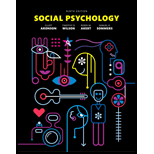
Introduction
In this case, the answer is option (C) schemas are useful in helping people organize information about the world, but they are problematic when they result in self-fulfilling prophecies.
Explanation of Solution
Correct answer and explanation
The best answer here is schemas are useful in helping people organize information about the world, but they are problematic when they result in self-fulfilling prophecies. Schemas serve as mental structures that people use to help them organize information about the social world. It includes our knowledge of several different things, ranging from us to others to social roles and specific events. They help us make sense of the world and fill in the gaps of our knowledge. We are not passive beneficiaries of information but can actually unintentionally make our schemas come true by how we treat other people, which in turn results in a self-fulfilling prophecy.
Explanations for incorrect options
Option (A) refers to schemas usually being erroneous because of self-fulfilling prophecies. While schemas can prove problematic because of self-fulfilling prophecies, they don't necessarily result in such judgments always being erroneous. So, option (a) is incorrect.
Option (B) refers to schemas usually being beneficial because they help us organize and fill in the gaps. While schemas can prove useful for helping us make sense of things, they can at times also be problematic when they result in self-fulfilling prophecies. So, option (b) is incorrect.
Option (D) refers to schemas being useful for organizing information about people but not events. However, schemas can also include our knowledge about specific events. So, option (d) is incorrect.
Therefore, the options (A), (B), and (D) are incorrect.
Want to see more full solutions like this?
Chapter 3 Solutions
Social Psychology (9th Edition)
- discuss contemporary examples of social debate, such as vaccination, mask-wearing during a pandemicarrow_forwarddiscuss contemporary examples of social debate, such as vaccination, mask-wearing during a pandemic.arrow_forwardWhy are conditions like a well-informed public, fair elections, the rule of law, a free press, and respect for individual rights necessary in a democracy?arrow_forward
- 00:07 ◄ Files O chrome://external-file Welines for discussion GRADE 11 APRIL 2024 Mapping: ° 0 0 ° Find a map of South Africa, that indicate the drought-stricken areas. Annual Rainfall graphs of the past FIVE years. Brief discussion on the annual rainfall graphs (± EIGHT LINES) Pictures of the different types of droughts. Toduction: Discussion on the different types of droughts graph 1: can droughts be triggered by: • Physical(natural) conditions ° Human activities graph 2: ne the Negative impact of droughts on: • The Economy of South Africa о aragraph 3: The Farmers of South Africa D cuss drought prevention and drought preparation strategies graph 4: is the relationship between Climate change and the regularity of droughts nclusion/Summary: at is the way forward regarding droughts for the government and the people of South ← + Scanned by TapScanner 20arrow_forwardIs the current usage "goodbye" "good-bye" or "good bye"arrow_forwardSelect a Christian organization from the "Christian Organizations That Address a Consequence of the Fall" list provided in the topic Resources. Based upon your selection, research the issue that organization addresses. Use and cite at least two academic resources from the GCU Library. Cite all of the resources used with in-text citations. Include all the sources you cite on a reference section at the end of this document. Based on your research, address the following: highlight how the consequences of the fall are evident in the issue(s) that the organization addresses; include statistics, causes, and impact on people (victim, perpetrator, others as appropriate).arrow_forward
- 1- do you consider yourself defined more strongly by your race or by your ethnicity? How so? 2-Given that subordinate groups have some common experiences , why is there such deep conflict between some of these groups? 3- What would need to happen in the United States, both individually and institutionally, for a positive form of ethnic pluralism to flourish in the twenty first century?arrow_forward3:38 10. 66.0 KB/S © No CHANEL Official Website: Fashion, Fr chanel.com/us く CHANEL FASHION THE CHANEL 25 HANDBAG SEE THE CAMPAIGN COOKIES ON CHANEL.COM CHANEL uses cookies and other online tracking technologies for analytics, advertising, and otherwise enhancing your experience. You can manage your preferences by clicking on 'Cookie settings. By continuing to navigate in our website, you consent to these technologies and our Terms and Conditions of Use. To learn more, see our Legal Statement and Privacy Policy. Cookies Settings = 55 Earrow_forwardHow can we balance free expression with the need for reliable information in a democracy?arrow_forward
- Discuss Benedict Anderson’s chapter 5, Old Languages, New Models. Student’s may address but are not limited to discussing the influence of language on identity and the use of language by colonizers.arrow_forwardWhat forces drive the future? What are some of the ways that future events may present themselves? How does your personality type impact your future as a driving force?arrow_forwardHas the rise of social media platforms helped or hurt the democratic process more?arrow_forward
 Social Psychology (10th Edition)SociologyISBN:9780134641287Author:Elliot Aronson, Timothy D. Wilson, Robin M. Akert, Samuel R. SommersPublisher:Pearson College Div
Social Psychology (10th Edition)SociologyISBN:9780134641287Author:Elliot Aronson, Timothy D. Wilson, Robin M. Akert, Samuel R. SommersPublisher:Pearson College Div Introduction to Sociology (Eleventh Edition)SociologyISBN:9780393639407Author:Deborah Carr, Anthony Giddens, Mitchell Duneier, Richard P. AppelbaumPublisher:W. W. Norton & Company
Introduction to Sociology (Eleventh Edition)SociologyISBN:9780393639407Author:Deborah Carr, Anthony Giddens, Mitchell Duneier, Richard P. AppelbaumPublisher:W. W. Norton & Company The Basics of Social Research (MindTap Course Lis...SociologyISBN:9781305503076Author:Earl R. BabbiePublisher:Cengage Learning
The Basics of Social Research (MindTap Course Lis...SociologyISBN:9781305503076Author:Earl R. BabbiePublisher:Cengage Learning Criminalistics: An Introduction to Forensic Scien...SociologyISBN:9780134477596Author:Saferstein, RichardPublisher:PEARSON
Criminalistics: An Introduction to Forensic Scien...SociologyISBN:9780134477596Author:Saferstein, RichardPublisher:PEARSON Sociology: A Down-to-Earth Approach (13th Edition)SociologyISBN:9780134205571Author:James M. HenslinPublisher:PEARSON
Sociology: A Down-to-Earth Approach (13th Edition)SociologyISBN:9780134205571Author:James M. HenslinPublisher:PEARSON Society: The Basics (14th Edition)SociologyISBN:9780134206325Author:John J. MacionisPublisher:PEARSON
Society: The Basics (14th Edition)SociologyISBN:9780134206325Author:John J. MacionisPublisher:PEARSON





